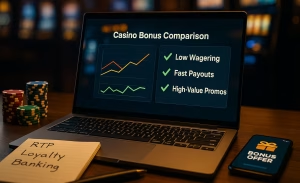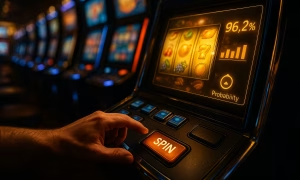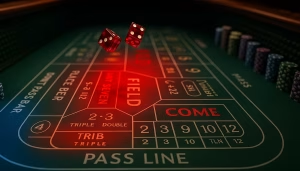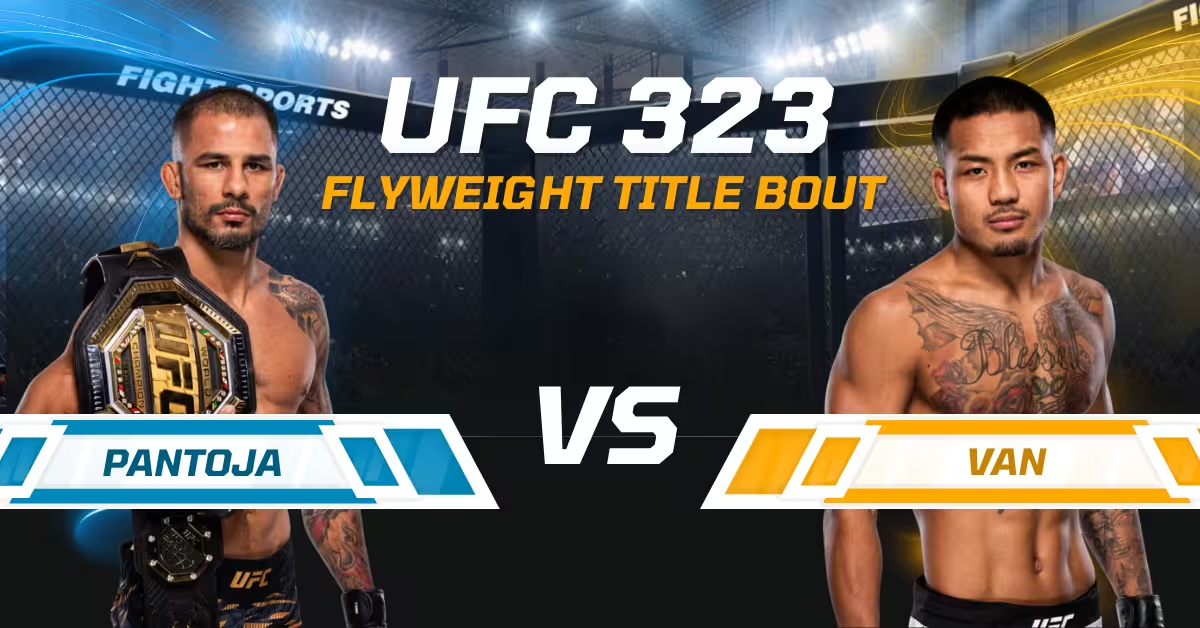How to Build a Casino Budget That Actually Helps You Win More Often
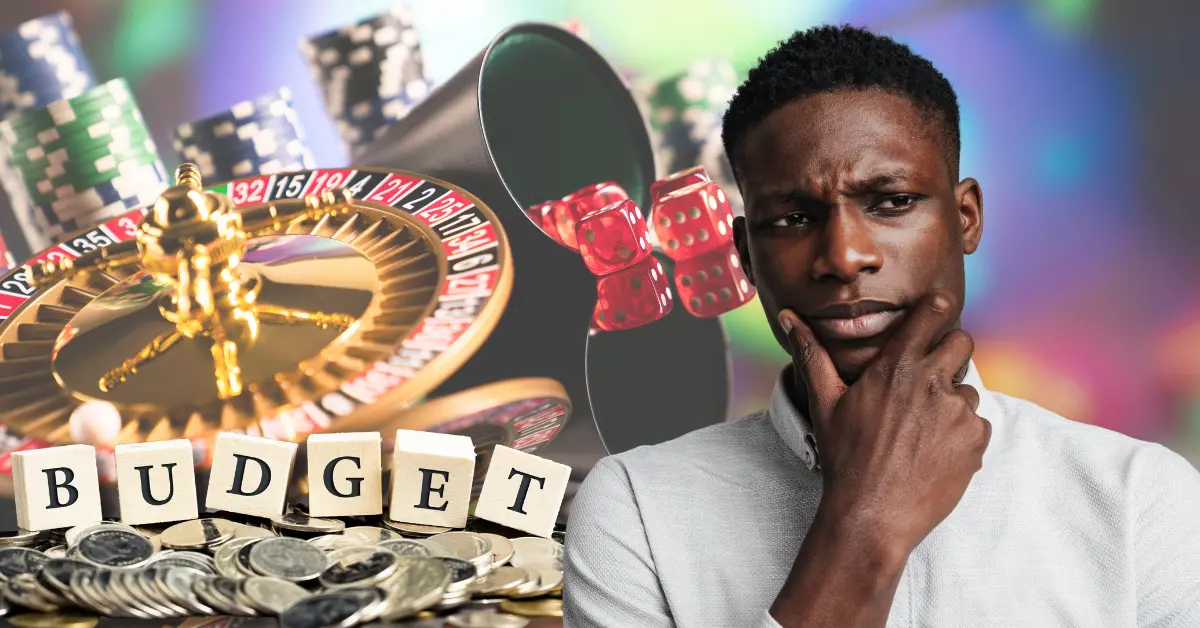
You’ve got a big night planned! You’re hitting up a casino or playing online, and there’s so much fun to be had. And you could possibly win big.
Don’t get too excited, though, because the house always wins. If you doubt us, here are the facts: Out of 700,000 online gamblers, 96% of them lose money. Those are not great odds, which is why the smartest players look at gambling like what it’s meant to be—an entertainment expense.
And you know what that means? A budget. Before you play, you should have a set amount that you won’t go over.
We can help you build your casino budget! Our guide will tell you how to do it smarter, what your budget should look like, methods, tips, and the apps and tools that can help you out. You’ll end up knowing how and why a proper budget can help you keep more of your wins (or at least fewer losses) when you gamble!
Why Most People Lose at the Casino
Look, losing money is the common outcome in casinos. All casino games (yes, all) are literally designed with a built-in advantage for the house. Over thousands or millions of bets, that little edge equals huge profits for the casino.
Even if the house edge is low, like under 1% in blackjack (with perfect play), and slot machines with edges of 2%. No matter how “lucky” you feel, the math will never change. And the more you play, the more that math will work against you, so you’re destined to leave with less money than you started out with.
Below are the most common reasons why people lose at a casino:
- Gambler’s fallacy and streaks: A lot of people fall for the idea that a streak of losses means a big win is “due.” But the odds reset with every spin or hand. The chance of turning a losing streak into a winning streak? It doesn’t exist. Believing in streaks or thinking that you can outsmart the randomness turns into chasing losses, and that means bigger financial losses.

- Chasing losses: When players go on a losing run, they will double down to recoup what they’ve lost. But this guarantees bigger losses because the house edge still applies to every bet. Problem gamblers end up fueling a large share of a casino’s profits: one analysis estimated that gambling addicts account for around a quarter of all casino profits. The longer you chase your losses? The deeper of a hole you dig.
- Illusion of control and emotions: Humans absolutely despise randomness. We want to believe that we have more control than we really do. This is called the illusion of control, which is the mistaken feeling that you can predict or influence random outcomes. And it causes gamblers to make riskier bets or bet on “hunches” instead of reality. Emotions only make it worse: big wins can make you careless, and big losses can trigger desperation. Experts recommend a cooling-off period after an emotional event, like waiting 24 hours after a big win or loss before you bet again, because acting while you’re emotional almost always derails your budget.
The house edge + human psychology = most players losing. It isn’t because gamblers are unlucky; it’s by design. Every slot, card game, and bet is crafted so that (on average) players will bleed money over time. That’s why the key to winning more often is to manage your money, control how you bet, and when you stop!
What a Good Casino Budget Looks Like
A good casino budget is a plan that lets you gamble within your means. It treats gambling money like any other entertainment expense and not like its extra income or a solution to bills. In practice, a smart budget has three core features: (1) it’s a fixed amount you can afford, (2) it’s broken into manageable portions (by time or session), and (3) it includes clear stopping points for losses or wins.
You should allocate only 5% of your disposable income to betting. That means if you have $1,000 left after paying for your essentials, you’d set aside about $50 for gambling each month. This mirrors general budgeting advice that entertainment should be a small slice of your finances. Another rule of thumb: never gamble money that you need for bills or essentials. Treat your budget as “fun money” that you can afford to lose.
Once you pick a total budget (like $200 for the trip or a month), break it down into further pieces. A solid approach is to divide the budget by sessions or days. You might decide to use $50 on each casino visit if you plan four outings. Alternatively, you could set a time or session limit: e.g., $20 per session at the slot machine until your $200 runs out. This prevents blowing the whole budget in one big bet. Within each session, you should also set a loss limit: decide how much of that session’s money you’ll lose before you stop (e.g., if you lose $10 of the $20 session budget, you quit).
A useful way to visualize this? In casino chips. Look at your $200 budget as stacks of poker chips, and only play with those chips. Once the chips are gone? You’re done gambling.
A good casino budget is realistic, disciplined, and transparent. It’s an amount you’re genuinely okay with spending. You then set clear rules: per-session and per-bet limits, plus a loss-stop.
Step-by-Step: How to Build Your Winning Casino Budget
Want to learn how to build a winning casino budget? Look below for a 7 step-by-step guide on how to do it!
- Calculate Your Disposable Income – First up is figuring out how much you actually have to spare each month. This means listing all income (paychecks, side gigs, etc.) and subtracting your essential expenses (rent, bills, groceries, car payments, etc.). This is your disposable income, and only the money that’s left over after essentials counts. If you earn $3,000 after taxes and your monthly bills total $2,500, your disposable income is $500.
- Set the Gambling Budget Percentage – Decide what portion of that disposable income goes to gambling. As we said above, 5% or less is a safe cap. That means that 5% of $500, or $25 per month, can be spent on gambling. The main rule is that this number should not affect any bill or savings goal. If you want to be extra cautious, you can use a smaller percentage, like 2–3%.
- Divide it by Sessions/Days – Once you have your total, allocate it in smaller chunks. If you have $25 for the month, you could go to the casino twice a month. You would then bet up to $12 each visit. Alternatively, others will budget by time: e.g., $5 per hour of play. Breaking it down this way keeps each session focused.
- Establish Win and Loss Limits – Part of a budget is knowing when to stop, whether you’re winning or losing. Decide beforehand: “If I lose half of my session allowance ($6 of the $12), I’ll quit. If I win a certain amount (e.g. double a bet), I’ll pocket some winnings.” You should always quit while you’re ahead, because chasing bigger wins means that you’ll probably lose them again. In practice, many players follow a simple rule: stop when you reach either your loss cap or a target win. Automatic stops enforce your budget without any emotional second-guessing.
- Use Cash or Separate Accounts – The best way to enforce your budget? Physically separate the money. A good way to do this is the envelope system, which just means that you take your session funds out as cash (or chips) and put them in an envelope that’s labeled for gambling. Leave your credit and debit cards at home. When the cash is gone? The session ends. It’s a tactile method that prevents overspending via digital transactions. And for online casinos or sports betting, set up a separate bank account or e-wallet with just your gambling funds. This way, you won’t spend more.
- Track Every Bet – Keep a running tally of your wins and losses in each session—write it down or use an app! Then you’ll always know exactly where you stand in relation to your budget. There are free tracking apps that let you log each bet and alert you when you approach your preset limits. You can also make a basic spreadsheet or note on your phone. The goal here is to eliminate guessing. If you know that you’ve bet $30 of your $50 session budget, you’ll rein yourself in instead of betting more.
- Review and Adjust – After each session (or month), look at how you did. Did you consistently hit your loss limit? Were you quitting too early with profits on the table? Use this data to fine-tune your system. If you keep losing quickly, you might need to lower stakes or decrease session length. If you never reach your limit, maybe you can afford to increase it a little. A monthly review allows for adjusting your budget for any income or expense changes, and decides if your strategy is working.
7 Psychological Tricks to Stick to Your Budget
What good is a perfect budget if you ignore it? The hardest part of gambling discipline is the psychology: those spur-of-the-moment urges. The following are some practical tricks that can help you stay on track:
- Pre-commitment and “cooling-off” periods: Before the gameplay commences, commit that you will stop when the budget is gone. Once you lose your session allowance, walk away, even if you feel that you’re “close” to a win. A useful tactic is the cooling-off period: after a big win or loss, take a break from betting for a set time (e.g., an hour or 24 hours). Taking a forced break means you can think clearly and remember your plan.
- Use visual reminders of limits: Keep your budget front and center. If you use chips, stack them visibly on the table (or set up separate piles for each game). For online play, you can set timers or alarms. You can also use something as simple as a Post-it note on the machine or table that reminds them of their budget. The cues help counteract impulsive decision-making.
- Set time limits, too: Money isn’t the only budget. Decide in advance how long you will play. Gamblers can lose track of time and end up overspending. Use your phone’s timer, and when that timer goes off? Cash out. It’s a good psychological reset, and after you’ve taken a breather, you can reassess calmly if you want to keep playing or stop.
- Avoid alcohol or distractions: Alcohol and gambling are a notorious mix for busting budgets. Drinking lowers your inhibitions and makes you much more likely to make reckless bets. A general tip is this: drink water or caffeine instead of alcohol while you’re playing. Remaining mentally sharp helps you stick to your budget plan.
- Keep to your limits with tech: All legit and licensed casinos (online or physical) have built-in tools. There are gambling sites that allow you to set deposit limits or session timeouts in your account settings. Casino apps and sportsbooks also have spending caps, and if you use Mint or YNAB, you can set a category budget so that you get alerts when you hit it. Use them! Even if it’s just toggling a setting that blocks further play when you’ve lost a set amount, it enforces your budget.
- Mind the biases: Constantly check yourself by being conscious of the illusion of control. Repeat the mantra that every bet is independent, and you cannot “force” a win by betting bigger after a loss. Mentally write off what you already lost as gone, and don’t look at your next bet as “getting back” that money. Treat every bet as if it’s a new one, and ask yourself before each bet: “If I lose this, will I be okay?”
- Reward yourself for discipline: Positive reinforcement works, too! Give yourself a little non-gambling reward if you stick to your budget. This frames budgeting as a part of the entertainment.
Use pre-commitment, reminders, and review points to keep your budget at the front of your mind. Research says that displaying clear odds or costs can lead to better decision-making. For most people, the hardest bets to resist are the impulsive ones. When you plan for impulses and use self-control tools, you improve your chances of walking away on plan.
Casino Budgeting Tools and Apps
You’re not limited to a pen and paper for bankroll management anymore! There are a lot of dedicated apps and online tools that will help you keep that gambling budget intact. The following are the ones that we like best:
Dedicated Gambling Trackers
There are apps that are specifically for tracking bets and budgets.
- Gambling Tracker: Manage Money is one that enables players to log every wager across slots, table games, and sports bets, and shows you at a glance how much of your budget is left. The app can generate reports on your wins/losses by game, so that you can see patterns.
- Our second pick is the Casino Tracker 2.0. It works on both iOS/Android, and you can allocate “wallets” for each game. According to its creator, Casino Tracker 2.0 “Helps users manage their bankroll and track their casino bets across various games, including blackjack and poker, so that they “never exceed their spending limits.” Both of the tools are customizable ledgers, and are super handy if you like digital over the envelope system.
General Budgeting Apps
Popular finance apps can also be repurposed for your gambling budget!
- You Need A Budget (YNAB) is a versatile budgeting app where you can create categories, and users are able to set up a “Casino” or “Entertainment” category and give it a limit. YNAB itself is a really great tool for managing a bankroll and preventing overspending.
- Mint (free from Intuit) allows you to set budgets and will alert you if you go above them. You can link your gambling account or track cash withdrawals. Mint encourages responsible play by letting you set specific spending caps to make sure you’re never betting over your budget.” The advantage of these is that they fit into your overall financial picture, so you are able to see gambling alongside your bills and other expenses.
Casino and Sportsbook Apps

All gaming companies now have budgeting features built into their official apps. Popular casinos and sportsbooks (like Caesars and BetMGM) have their own dedicated mobile apps with spending tools. These encompass deposit limits, time reminders, and direct links to support. And there are some reward programs, like BetMGM Rewards, that let you monitor your spending on gambling while you rack up free drinks or comps. A gambling site should have “Responsible Play” settings—if it doesn’t? Don’t play there. Using the official app of the casino where you play is a convenient way to keep track of it within a single ecosystem.
Betting-specific Tools
For sports bettors, we recommend similar apps and calculators. There are even specialized apps like BetBuddy AI, which is an AI-driven platform (from Playtech) that has bet-tracking, risk assessment, and responsible-gambling alerts. While it’s still pretty new, it does show how advanced the tools are getting.
Therapy/Support Apps
If you feel like sticking to a budget isn’t working out and you’re worried about it becoming a problem, there are apps that can help you out with self-control. Gambling Therapy App is a free tool that has a self-assessment and can block gambling sites if you think that’s the best move. Likewise, Gambless is an app that’s backed by mental health professionals; it gives instant access to helplines, forums, and coping tools.
They aren’t “budget trackers” per se, but they do help enforce budgets by adding extra barriers and support if you start feeling like you’re losing control.
General Finance Tools
Don’t forget the simple hacks, like setting up email or SMS alerts from your bank for debit transactions or enabling daily balance reminders. There are people who find success using a basic spreadsheet that has real-time data, and you can categorize each bet and see the totals add up. And a photo of a losing hand can be a really sobering visual.
Using the above tools means that you have external checks on your budget. It could be an app that beeps when you exceed 90% of your monthly bet limit, or a spreadsheet that shows you where your money is going.
Myth-Busting: Does a Budget Help You Win?
There’s a super common misconception that setting a budget will detract from the fun or is pointless in gambling. Both are wrong, so allow us to clear up a few of the most rampant myths!
Reality: The budget doesn’t stop wins; it just limits your losses. Winning a big jackpot is random and super rare for anyone. A budget doesn’t make you less lucky—it just means that if you do win, you only risked what you could afford. Guess what? Budgeting could help you catch that jackpot by keeping you in the game longer (via smaller bets) until luck strikes. But without a budget? You could spend recklessly and not last long enough to hit a jackpot. Budgets don’t prevent big wins; they make sure that you play responsibly in pursuit of them.
Reality: Professional gamblers use bankroll management, and if they do it? So should you. Discipline is what separates serious players from amateurs. All of the pro players have hard and fast rules about how much they bet and when to stop, and that’s what a budget is! Every winning poker pro or advantage player has a bankroll strategy. The casino doesn’t care who bets more—only that the house edge works. A good budget is about sustainable play, not about skill level.
Reality: Nope, this is the gambler’s fallacy at work. Every game is independent, and past losses do not change future odds. The more you play? The more you are being pulled toward the house edge due to the “law of large numbers.” No one can beat those odds, and that there’s no likelihood that a string of losses will somehow turn into wins. The longer you play chasing wins, the more likely you are to lose on average—a budget forces you to stop before the math grinds you totally down.
Reality: Actually? It makes gambling way less stressful. Without a budget, anxiety will build as your losses pile up. With a budget, you know exactly where you stand. Again, casinos profit from those who can’t stop. A budget is the ultimate tool for enjoying gambling as entertainment.
Reality: This is just dumb. Yes, it’s true that the lion’s share of gamblers lose, but that in no way means that you have to be one of them. Those losses feed casino profits, and although having a budget won’t turn you into one of the 4% of winners, it does make sure that you’re not part of the uninsured losses either. It just means that you walk away having spent only what you planned, instead of money that you can’t afford to lose. And casinos have been known to curb what they consider to be “frequent winners,” so real winning streaks are so rare that they can get players banned. Your goal is to minimize losses and protect your stake.
Reality: Luck is temporary. If you’ve ever been on a lucky streak, you know it can disappear in an instant. Without a budget? A sudden run of bad luck can erase all of your earlier wins and your bankroll. With a budget, you always reserve a portion of your winnings or funds, so one bad break won’t wipe you out. Even the luckiest players should use a budget to lock in their gains.
A budget doesn’t lessen your chances of winning, but it reduces the chance that a win will turn into an overall loss. It doesn’t change the odds of a given game, but it improves how well you ride those odds. Focusing on low-volatility games where wins can happen more often can help build your bankroll. Your budget is the foundation of smart play, not some kind of a crutch. It keeps you in the game longer, maximizes any winnings that you have, and keeps the house’s inevitable edge from taking more than its fair share.
Final 8 Tips for Smart Casino Play
You want to maximize your gameplay and protect your budget, right? Right! Next, we’re going to go over a few extra pointers so that you can play smart and responsibly.
- Know the games and odds: Always make sure that you understand the rules and odds of any game before you bet. You have the best odds with blackjack and craps (on simple bets) with a house edge that’s around 1-1.5%, whereas games like keno or Big Six can have house edges that are over 20%. Choosing low-edge games (and playing them correctly) stretches your budget further. If you play blackjack, learn basic strategy; if you play poker, play within your skill level. In sports betting, stick to sports and bet types that you really understand. The game you play has a statistical probability against you, so play the ones where that probability is as small as possible.
- Take advantage of bonuses and comps: Use casino bonuses or free spins if they help your budget, but be really wary of onerous wagering requirements. Those free bets can pad your bankroll if you play sensibly, but don’t dip into your budget to unlock them. Also, use your player’s card or loyalty program. Even if you don’t “lose” less, getting free meals, show,s or hotel credits from the casino makes the financial blow a little softer. It’s an indirect way to get more value from the same budget.
- Play slowly and bet small: The biggest mistake you can make is betting too much too quickly. If you want your budget to last, bet the minimum or near-minimum whenever possible, especially on slots, as it spreads out playtime. Low-volatility slots (which pay small wins regularly) can build your bankroll gradually. For table games, avoid max bets unless you want to gobble up your budget. Use a simple rule like “bet 1–5% of my session bankroll on each play.” That way, if luck isn’t on your side, you’ll have more bets to make with your budget.
- Set a profit goal and stick to it: In addition to loss limits, you should set a modest win goal for the session. Say you plan to leave after winning 50% of your session bankroll (e.g., turning $50 into $75). If you hit that, pocket your budget plus your profit, and call it a day. This is psychologically powerful: you get a win and follow through, rather than playing o,n hoping for more (which usually backfires).
- Avoid high-risk side bets: A lot of casino games have some really tempting side bets (e.g. roulette’s “neighbor bets,” craps proposition bets, or card game side wagers). These usually have way higher house edges than the main game, so treat all side bets like they are poison for your budget. They look appealing, but the house edge on them is usually 10–30% or more. Stick to the main bets that you understand.
- Stay sober and rested: Gambling tired or drunk is a sure way to blow your budget. A good habit is to step away for fresh air or a snack when you feel tired, or to drink water instead of alcohol while you play.
- Treat gambling as entertainment: Always remind yourself that this is a game, and you’re paying to play it (with the hopes of a win). If you approach gambling wanting money, you’ll chase wins like you’re chasing a mirage. Only bet money you’re truly happy to spend on fun. If you see a loss as the cost of entertainment, you ditch the stress and will have more fun!
- Learn from every session: After playing, think about the decisions that you made. Did you overbet in anger after a loss? Did you miss an easy set-win because you kept on playing? Reflection can reinforce good habits and eliminate the bad ones.
There is no foolproof way to beat the house. Every time you play, the odds are on the casino’s side. But if you budget wisely, use the right tools, and play smart, you give yourself the best possible chance to win more often or at least reduce your losses. You’ll stay in the game longer, have fun with any wins, and walk away with control over your money.
Conclusion: The House Has an Edge, But You Can Fight Back With Your Budget
The casino will always have the mathematical edge, end of story. In the long run, most gamblers will lose money. But when you have a budget? You can fight back on your terms! Unfortunately, it won’t change the odds of a slot spin or a poker hand, but what it can do is keep you from being one of the large losses that literally fund the house.
Having a solid budget means that you set an absolute limit on what you lose. You make gambling a controlled form of fun rather than an out-of-control expense. The data underscores how important this is: giving yourself strict limits and reminders of the house edge has been proven to decrease betting and overspending. When you treat your betting money as part of your entertainment budget, you are reducing risky gambling behavior and maintaining discipline.
A budget won’t guarantee a win, but it guarantees that you’ll only risk what you plan. If luck isn’t on your side, you won’t walk away regretting a loss that you didn’t plan for. And if luck and fortune do smile upon you? You’ll have protected your profit instead of wasting it.
You can take the edge out of the casino’s favor by taking control of your bankroll. Stick to your limits, gamble responsibly, and you’ll be playing smarter—and winning more often—in the only way that matters: by winning on your terms, not the casinos’.

Alyssa contributes sportsbook/online casino reviews, but she also stays on top of any industry news, precisely that of the sports betting market. She’s been an avid sports bettor for many years and has experienced success in growing her bankroll by striking when the iron was hot. In particular, she loves betting on football and basketball at the professional and college levels.

